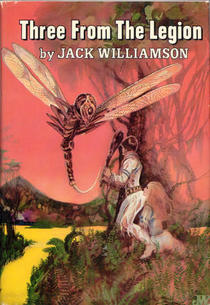
https://www.goodreads.com/review/show/998322353?book_show_action=false .
Really, each succeeding novel was better than the last, and while the first book was published in 1935, the third dated from 1950, and the final novella tucked in at the end of that was actually 1967, so by the end we were reading much more mature and modern work.
Rafeeq
Having already written a review of The Legion of Space
https://www.goodreads.com/review/show... before realizing that this novel also is collected in Three from the Legion, now I will finish up with the full omnibus trilogy.
Although I had harped on some nagging features of the first Legion novel, the following works in the series struck me as noticeably better, which was a pleasant surprise. Yes, we are still reading space opera from the Golden Age of science fiction, so good is good, and bad is bad, with non-humans such as aliens from outside the Solar System or mad-scientist-created androids being the latter, and the flinty-eyed, usually tall officers of the mighty Legion of Space guarding the former. Fair enough for the genre. Still, the characters and the points of view brought by these succeeding books pull a series that began for me in the two-to-three star region into the neighborhood of more like four stars.
Whereas John Star of The Legion of Space (1935) does not seem very well developed, even for the 1930s, his son, Bob Star, the protagonist of The Cometeers (1936), is more conflicted, more human, and hence more interesting. Bob is young and very capable, but he is less sure of himself than was his father at that age, and secretly vulnerable. In striving to beat the grades of the number-one student at the Academy, an upperclassman who has it out for Bob and hazes him mercilessly, the boy has worked himself to the edge of a nervous breakdown. Now after graduation his parents have tried to keep him at home, shielded from the peculiar news brewing at the edge of the Solar System, so that he might rest up before receiving his first space assignment. Such treatment galls...and the throbbing beneath the scar on his forehead, a reminder of the torture--literal torture--of rival Stephen Orco never goes away either. Still, when a strange green comet-like object sails in from interstellar space like a dreadnought, the youngster at last will have the chance to prove himself--oh, yes, and save the Solar System and find himself a girlfriend, too.
When Williamson revisits the series almost a decade and a half later in One against the Legion (1950), the protagonist is another firm-jawed young officer aching for his first assignment, only here the youngster is framed for murder and the theft of a top-secret device, and he is imprisoned, convicted as a traitor, and even tortured by Legion interrogators before finally escaping. This time, therefore, the once-infallible Legion of Space is fallible indeed, and as the deeply wronged Chan Derron tries to find out why a super-criminal calling himself the Basilisk is framing him for crime after crime, he will have to get to the bottom of another threat to all humanity.
Finally, although Nowhere Near (1967) is listed as being part of One against the Legion, it is a completely separate novella, taking place years after and light years away from the previous tales. This one is told in first-person point of view rather the sometimes-pompous third person, and it is...well, let us say a decade and a half more sophisticated. Cosmological speculations on the age of the universe and whatnot happen to be rather dated now, but the piece is so much more modern and subtle than even the 1950 book. The narrator, the commander of a space station near a strange spacetime anomaly, is experienced and a little weary, and he is not immediately swept to breathless admiration by the waddling entrance of the Giles Habibula, the now-famous gourmand/lockpick/incipient alky of the previous novels, nor even by the flourishing of the name of the distinguished Star family. And when some grizzled-veteran-meets-girl occurs, even that is made almost tolerable by its less cliched execution.
While the first installment of the Legion of Space saga does not age especially well, the following works get better and better, slowly shedding their histrionics across the decades, and even growing quite palatable indeed. I only wish Williamson had not begun the series with a "found manuscript" narrative frame that he then seems to forget and never close...
16 July 2014
 RSS Feed
RSS Feed
